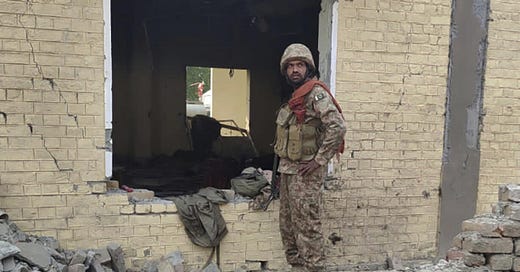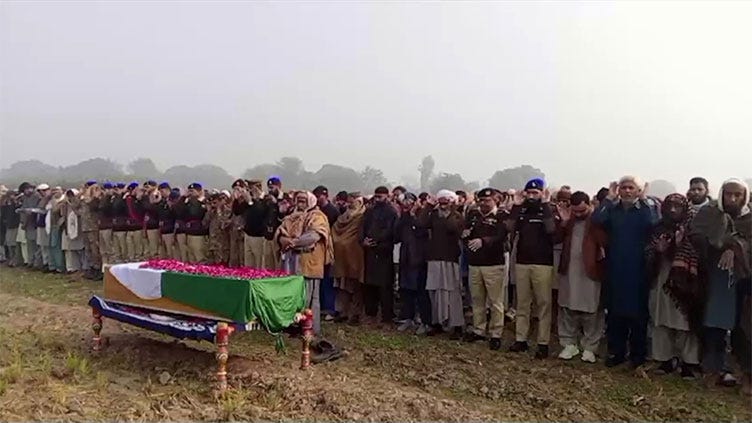Pakistan's Frankenstein: Taliban Offshoot Suicide Bomber Kills 23 Soldiers
Suicide Bombing at Pakistani Border Police Station Claims 23 Soldiers' Lives.
Deadly Attack on Police Station in Northwest Pakistan: 23 Troops Killed, 32 Injured
In a stark reminder of the consequences of its historical policies, Pakistan was dealt a severe blow when a suicide bomber associated with a Taliban splinter group attacked a police station in northwest Pakistan. The early Tuesday attack, occurring on December 12 in Daraban, about 350 km southwest of Peshawar, resulted in the deaths of 23 troops and injuries to 32 others, along with causing partial collapse of the building. This attack, one of the most lethal in recent months, extended its devastation to nearby businesses and shops. The militant group Tehreek-e-Jihad Pakistan, believed to be an offshoot of the Pakistani Taliban, has claimed responsibility for this assault.
Further complicating the event, the military and local police reported that six additional assailants were involved in the attack on the police station, leading to an intense, hours-long shootout until all were neutralized. This incident serves as a grim marker in Pakistan's history, highlighting the perilous outcomes of its past alliances with extremist groups like the Taliban.
The Scene of the Attack
The attack, executed with a truck laden with explosives, targeted a military outpost, which was temporarily housed in a school in the Daraban region of Dera Ismail Khan. This region, situated in the volatile northwest Khyber Pakhtunkhwa, has been a breeding ground for the Pakistani Taliban. The aftermath was a scene of destruction, with collapsed buildings and the tragic sight of the fallen, both soldiers and attackers.
The Rising Specter of Militant Violence
This attack is part of a disturbing trend in Pakistan, where militant violence has surged alarmingly. The timing is particularly concerning, given the proximity to the country's upcoming February elections. This resurgence of violence poses a significant threat to the national security and political stability of a country already mired in deep-seated political divisions and an acute economic crisis.
The Aggressors and Their Claims
Claimed by Tehrik-e-Jihad, a group believed to be an offshoot or ally of the Pakistani Taliban, this attack underscores the complex and fragmented nature of militant groups in the region. The chilling details, as released by the group, reveal a calculated and cold-blooded approach, targeting soldiers in their quarters.

Previous Incidents: The Escalating Threat of the TTP
The emboldening of the Tehrik-e-Taliban Pakistan (TTP) following the Taliban's victory in Afghanistan has ushered in a new era of militant aggression in Pakistan. Intent on overthrowing the current government to install a conservative Islamic regime, akin to that in Afghanistan, the TTP's recent activities have highlighted their increasing boldness and organizational capabilities. A particularly harrowing instance was the brutal assault on a mosque in Peshawar on January 30, 2023, which resulted in the tragic loss of over 100 lives, laying bare the group’s escalating ferocity1.
Further emphasizing this resurgence, a significant incident unfolded on September 6. TTP militants mounted a daring attack from the rugged terrain along the Afghan-Pakistan border. In the ensuing hours-long intense combat, Pakistani military positions came under heavy fire, leading to the deaths of four Pakistani soldiers and 12 TTP militants. This cross-border strike, originating from Afghanistan, served as a stark wake-up call for Pakistani officials. It shattered the previously held belief that the TTP had been largely neutralized, highlighting the growing and increasingly complex challenge posed by this revitalized militant faction. These incidents not only mark a troubling uptick in domestic terrorism but also signal a dire need for Pakistan to reassess and strengthen its counter-terrorism strategies.
A Wake-Up Call for Pakistan
This recent attack is a stark reminder of the growing strength and audacity of the Taliban offshoots in Pakistan. The country, which once believed it had largely subdued the Tehrik-e-Taliban Pakistan (TTP), now faces a renewed challenge. The TTP's objective is clear: to overthrow the Pakistani government and establish a conservative Islamic regime, mirroring their Afghan counterparts2.
The Karmic Lesson for Pakistan
In conclusion, this tragic event serves as a hard-hitting karmic lesson for Pakistan. It illustrates the bitter truth of the adage, "What goes around, comes around." For years, Pakistan has been accused of fomenting unrest in neighboring regions, particularly in Jammu and Kashmir, India. However, the time has come for Pakistan to introspect and realize the perils of its past actions. Rather than sowing seeds of discord, it should embark on a path of peaceful co-existence and regional stability. As it stands, Pakistan reaps the whirlwind of the wind it once sowed, a stark reminder that the pursuit of violence only begets more violence. The country must now focus on fostering peace and harmony, both within its borders and in its relationships with neighboring nations.
Pakistan's Frankenstein: The Taliban's Ghost Returns to Haunt it
Taliban's Afghanistan: A Surge in Terrorist Strikes inside Pakistan The recent upsurge in terrorist activities across Pakistan, notably the recent harrowing strikes in Peshawar, casts an ominous shadow across the near-failed state in India’s neighborhood. The takeover of Afghanistan by the Taliban in August 2021, an event closely watched globally, had un…
Pakistan Displaces, Deports Afghan Refugees to Devastation and maybe Death
Forgotten and "Unnoticed" Exodus: Global Spotlight vs. The Afghan Refugees In a world incessantly beset by images of violence and upheaval, the plight of Afghan refugees in Pakistan is a sobering testament to the uneven distribution of global attention. As interna…








